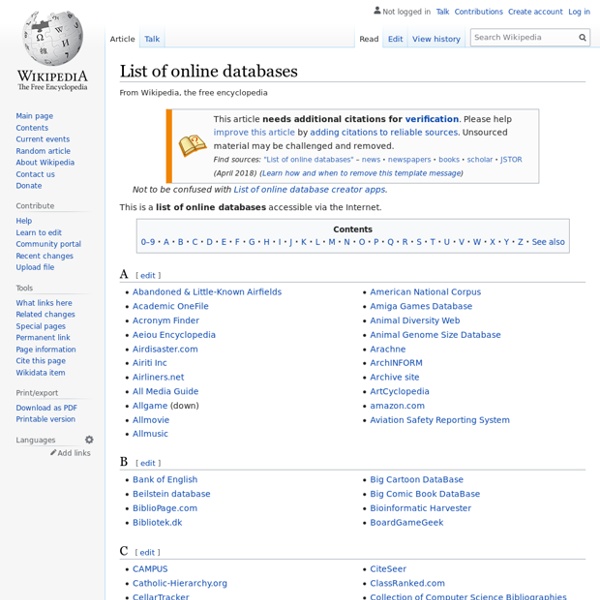



https://en.wikipedia.org/wiki/List_of_online_databases
Related: Need to Organize • Saved WikiList of academic databases and search engines Wikipedia list article This article contains a representative list of notable databases and search engines useful in an academic setting for finding and accessing articles in academic journals, institutional repositories, archives, or other collections of scientific and other articles. Databases and search engines differ substantially in terms of coverage and retrieval qualities.[1] Users need to account for qualities and limitations of databases and search engines, especially those searching systematically for records such as in systematic reviews or meta-analyses.[2] As the distinction between a database and a search engine is unclear for these complex document retrieval systems, see: the general list of search engines for all-purpose search engines that can be used for academic purposesthe article about bibliographic databases for information about databases giving bibliographic information about finding books and journal articles.
Ontology (information science) While the etymology is Greek, the oldest extant record of the word itself, the New Latin form ontologia, appeared in 1606 in the work Ogdoas Scholastica by Jacob Lorhard (Lorhardus) and in 1613 in the Lexicon philosophicum by Rudolf Göckel (Goclenius). The first occurrence in English of ontology as recorded by the OED (Oxford English Dictionary, online edition, 2008) came in Archeologia Philosophica Nova or New Principles of Philosophy by Gideon Harvey. Contemporary ontologies share many structural similarities, regardless of the language in which they are expressed. Most ontologies describe individuals (instances), classes (concepts), attributes and relations. Category:Online databases This is a list of databases made available on computer networks, usually the Internet. Some of these sites are freely available and some require payment or membership. Subcategories This category has the following 18 subcategories, out of 18 total. Pages in category "Online databases"
Zooming user interface Example of a ZUI When the level of detail present in the resized object is changed to fit the relevant information into the current size, instead of being a proportional view of the whole object, it's called semantic zooming.[1] Some experts consider the ZUI paradigm as a flexible and realistic successor to the traditional windowing GUI, being a Post-WIMP interface. But little effort is currently spent developing ZUIs, while there are ongoing efforts for developing other types of GUIs. List of largest wikis Wikipedia's distinction shown on the table between a "conservative" and an "inclusive" number of pages originated in 2002 with the replacement of UseModWiki's spontaneous wiki modes with MediaWiki's embedded namespaces. For Wikimedia projects: The conservative number for the Wikipedia excludes redirects, discussion pages, image description pages, user profile pages, templates, help pages, portals, articles without links to other articles, and pages about Wikipedia. This may not be true for other wikis.The conservative number for Wikimedia Commons and Wiktionary excludes "talk" pages, pages about Wikipedia, minimal "stub" pages, redirects, and others that probably don't qualify as content pages. Lists of Wikipedias by various criteria: edit
Xaitment Products[edit] xaitment currently sells two AI software modules: xaitMap and xaitControl. xaitMap provides runtime libraries and graphical tools for navigation mesh generation (also called NavMesh generation), pathfinding, dynamic collision avoidance, and individual and crowd movement. xaitControl is a finite-state machine for game logic and character behavior modeling that also includes a real-time debugger. On January 11, 2012, xaitment announced that it making its source code for these modules available to "all current and future US and European licensees".
List of MediaWiki websites This page contains a list of notable websites that use a wiki model. These websites will sometimes use different software in order to provide the best content management system for their users' needs, but they all share the same basic editing and viewing website model. §Table[edit] §See also[edit] XSLT XSLT (eXtensible Stylesheet Language Transformations) is a language for transforming XML documents into other XML documents,[1] or other formats such as HTML for web pages, plain text or XSL Formatting Objects, which may subsequently be converted to other formats, such as PDF, PostScript and PNG.[2] XSLT 1.0 is widely supported in modern web browsers.[3] The original document is not changed; rather, a new document is created based on the content of an existing one.[4] Typically, input documents are XML files, but anything from which the processor can build an XQuery and XPath Data Model can be used, such as relational database tables or geographical information systems.[1] Although XSLT is designed as a special-purpose language for XML transformation, the language is Turing-complete, making it theoretically capable of arbitrary computations.[5] History[edit]
List of genealogy databases This is a list of genealogy databases and online resources that are not specifically restricted to a particular place, family set, or time period in their content. Comparison of notable databases for uploading family trees[edit] Some of these also have social networking features. References[edit] XQuery Functional programming and query language for XML XQuery (XML Query) is a query and functional programming language that queries and transforms collections of structured and unstructured data, usually in the form of XML, text and with vendor-specific extensions for other data formats (JSON, binary, etc.). The language is developed by the XML Query working group of the W3C. The work is closely coordinated with the development of XSLT by the XSL Working Group; the two groups share responsibility for XPath, which is a subset of XQuery. XQuery 1.0 became a W3C Recommendation on January 23, 2007.[4] XQuery 3.0 became a W3C Recommendation on April 8, 2014.[5]